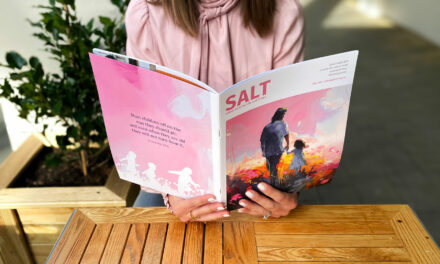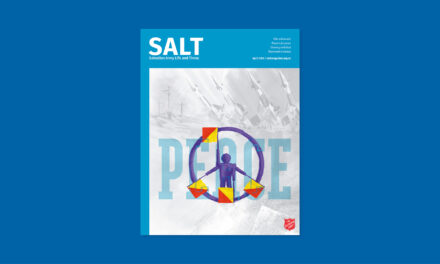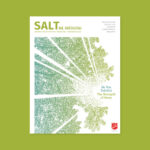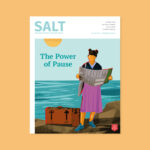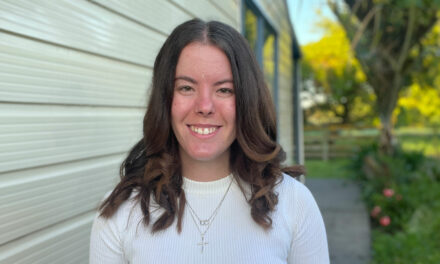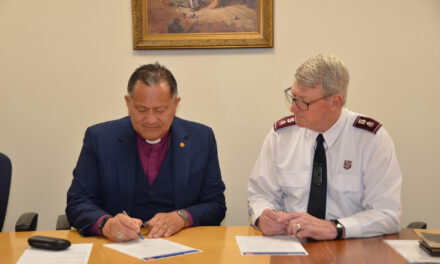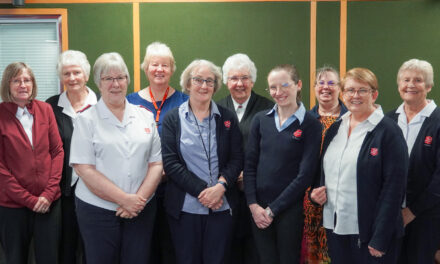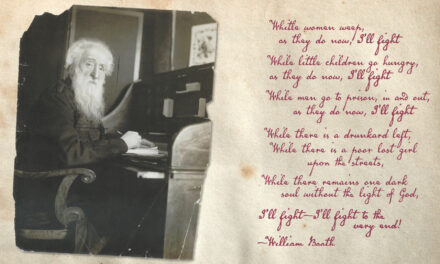
The Fale We Built Together

Christmas came early in Tonga last year! A team of six volunteers from New Zealand returned to Tonga for a week in early December to add the finishing touches on an EasyBuild house that will become the fale nofo’anga (officers’ quarters) for the Kolovai Corps Plant.
In October, a team of 15 volunteers worked tirelessly alongside locals for two weeks to get the fale as close as possible to completion within that gruelling timeframe. Prior to the build, Kolovai Corps Plant had not had an official fale nofo’anga. Various rental properties have served as officers’ accommodation since the corps was planted a decade ago. However, following the Hunga Tonga–Ha’apai eruption in January 2022 and the tsunami that followed, the need for a new, permanent fale nofo’anga became paramount.
‘It was an ambitious goal to bring together a team of 15 people who’d never worked together before to build a house in just two weeks,’ says volunteer build team leader Pete Walker. ‘But it was a goal the team embraced with enthusiasm and energy, and it’s amazing to see what we’ve achieved.’
Full immersion
It was a life-changing experience for most of the team, Pete reports. ‘We had the opportunity to live amongst Tongan culture for two weeks—not as tourists but living with the Tongan people and working side-by-side. Just being fully immersed in their world for a little while—well, it’s hard to put into words how special that was.’
Having previously served overseas with The Salvation Army and Save the Children, media liaison Mandy Carian was no stranger to living in another culture. ‘I just love being able to hang out with the local people, but there’s also the constant reminder of “oh yes, this is what a simpler way of life looks and feels like”. It’s important to understand the struggles others go through, and it makes being able to contribute a tiny bit of good in the world a blessing.’
Both Mandy and Pete are passionate about Salvationists understanding the motivation behind the project. ‘It’s a privilege and part of our responsibility as a territory to share resources,’ says Mandy. ‘It’s about coming alongside the local people and empowering them and encouraging them.’
‘To be quite raw,’ explains Pete, ‘at this point, The Salvation Army in Tonga just doesn’t have the resources to build a house—otherwise it would be done already! So we worked together on the project and a lot of learning took place.’
Legacy of love
Pete has a few personal connections to The Salvation Army in Tonga, as the regional leader, Captain Kenneth Walker, is Pete’s brother. The 2023 building project was especially poignant for the pair, with their sister Captain Pauleen Richards also serving in Tonga a decade ago. ‘Mum and Dad went over in 2013 and at the time Kolovai meetings were held in a large tent,’ explains Kenneth. ‘The story goes that Dad (Major Donald Walker, promoted to Glory) was looking up at the stars through the ripped roof of the tent. “We can do better than this” is the line from Dad that has become legend. He returned to New Zealand and wrote a proposal to headquarters to take a team over to build a falelotu (church building). It was approved, and in 2014 that’s what happened.’
Pete explains that with Kenneth now serving in the same role Pauleen previously held, the family connection to Tonga and their passion for the work is strong. ‘The whole time Kenneth has been serving in Tonga, he’s wanted to get a fale built for Kolovai,’ says Pete. And it’s still a family affair, with their older brother Graeme and some of his adult children adding to the team. But it’s also bittersweet. ‘Dad is now gone,’ explains Kenneth, ‘but it’s become a generational tradition.’ Kenneth hopes that further opportunities to work with Tongan Salvationists may arise in the future.
When asked what their dad would think of the latest project, Pete says, ‘He’d be stoked. He would’ve been there if he was still alive—even at 85. He would have loved seeing his sons and grandkids working together on this. It was the anniversary of Dad’s death while we were over there, actually. So Kenneth, Graeme and I took a photo in the fale and had a moment together—it was good.’
Generous to the core
For Pete, another strong motivator for the project is the practice of generosity. ‘Being able to help and use my skill set to make a difference is important to me. And having the privilege of choosing a team—just giving others the opportunity to have this kind of experience—has been a real personal highlight.’
While Pete grew up in The Salvation Army and is connected to Petone Corps Plant, the build team was comprised of people from all walks of life. ‘Only five of the team were Sallies, the other ten were like, “we can help with that so we’re coming too!” I learnt more about mission by watching these guys who wouldn’t call themselves Christians give of themselves so wholeheartedly. They were the hands and feet of Jesus without even knowing it,’ says Pete.
Six members of the team were Pete’s firefighter mates from across Aotearoa. One of those men, Hami Love, played a key role because he could speak Tongan, and was able to introduce the team during church and speak on behalf of the team. ‘Hami was a real gift to us,’ says Pete.
A beautiful story unfolded when Hami returned to New Zealand, which he shared with Pete. ‘Hami told me that he’d been talking to his mum, who said she used to go and collect for the Sallies years ago. She had a lot of love for the Sallies because one Christmas when the family didn’t have enough food, she went to the foodbank and they gave her food and presents for the whole whānau (family). The following year she didn’t want to ask for help even though she needed it but was surprised and happy to receive a Christmas package again.’ Hami didn’t know this when he signed up to go to Tonga. ‘This was my way to give back,’ he told Pete.
Part of that theme of generosity must be attributed to the families of the team who remained in New Zealand. Pete is adamant that recognition and appreciation be given to those who enabled their partners to vacate normal life for two weeks—and to come home physically and emotionally exhausted (in a good way).
‘None of us went with the expectation of getting anything,’ says Pete. ‘It was just the motivation to give and serve, but we got more than we gave,’ says Pete. ‘The blessings came back ten-fold.’


